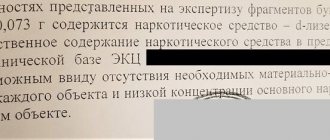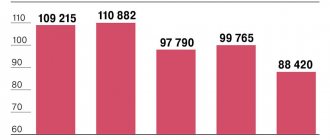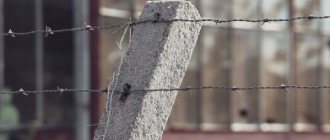Last updated March 2021
Harm to health implies a violation of the integrity of the body, which results in negative consequences. Causing grievous bodily harm is classified as a crime, but the specific article of the Russian Criminal Code is determined depending on the circumstances.
In turn, establishing the extent of damage is a medical, not a legal task, since the procedure requires certain skills and knowledge. Therefore, only a medical expert can determine whether the damage caused to the victim constitutes grievous harm.
Concept of grievous bodily harm
Criminal law understands the concept of “harm to health” as a violation of the integrity of the body, its functions, which arose under the influence of certain external factors. This concept is general for any type of damage, but is subsequently divided based on the degree of damage caused to the person.
Order of the Ministry of Health No. 194n was introduced to establish medical criteria, which are subsequently used to determine the severity of injuries.
- Paragraph 4 of Section 1 of the Order stipulates that the degree of damage is established only in state medical institutions. institutions. Accordingly, no third-party specialist or direct investigation (inquiry) worker can independently decide how exactly to characterize the injury received by a person.
- The order also establishes what exactly is meant by “serious bodily harm.” Thus, paragraph 6 of Section 2 indicates damage that can be classified as grave harm, namely damage that creates an immediate threat to the life of the victim, as well as that which causes the development of a life-threatening condition. Clause 6.2 supplements the list with injuries that result in disruption of particularly important functions, provided that they cannot be compensated by the body without medical assistance.
- Subsequent paragraphs (6.3-6.12) also expand the list of injuries that will be regarded as serious harm. These include the loss of one of the organs (including the loss of its functionality), senses, limbs, termination of pregnancy, persistent mental disorders and other injuries that lead to long-term more than a third or permanent loss of ability to work.
The onset of grave consequences as a qualifying feature of Art. 145.1 of the Criminal Code of the Russian Federation
Key words: grave consequences, non-payment of wages, causation, qualifying feature.
In accordance with Part 3 of Art. 37 of the Constitution of the Russian Federation, everyone has the right to work in conditions that meet safety and hygiene requirements, to remuneration for work without any discrimination and not lower than the minimum wage established by federal law, as well as the right to protection from unemployment. Therefore, non-payment of wages and other payments is one of the violations of the constitutional rights of citizens.
Respect and protection of constitutional rights and freedoms, namely the right to remuneration for work, is one of the priority tasks of the state represented by law enforcement agencies, since this indicator indicates the level of social and economic well-being of citizens. In addition, non-compliance with the rights and freedoms of citizens in this area is criminally punishable, which is embodied in Art. 145. 1 of the Criminal Code of the Russian Federation “Non-payment of wages, pensions, scholarships, benefits and other payments.”
It should be noted that the emergence of this crime in 1999 was preceded by an unstable economic situation in the 90s of the last century. This circumstance led to the mobilization of the state to protect the socio-economic constitutional rights of citizens.
The norm in question did not exist all the time in the same form as it does now. Federal Law of December 23, 2010 No. 382-FZ “On Amendments to Article 145.1 of the Criminal Code of the Russian Federation” Article 145.1 of the Criminal Code of the Russian Federation was set out in a new wording, which significantly changed its content. Thus, a distinctive feature was the introduction of part three, which was interpreted as follows: “Acts provided for in parts one or two of this article, if they entailed grave consequences.” This part is still presented in this form today. The issue of changing the responsibility for the criminal offense in question is also being actively considered. Thus, one of the results of the meeting of the Government Commission on Crime Prevention was a recommendation to the Investigative Committee of the Russian Federation and the Ministry of Internal Affairs of the Russian Federation to work out the issue of attributing Part 3 of Art. 145.1 of the Criminal Code of the Russian Federation to the category of serious crimes [7].
Analyzing the specified part 3 of Article 145.1 of the Criminal Code of the Russian Federation, it is worth noting that there is no legislative explanation of such a category as “grave consequences”. Resolution of the Plenum of the Supreme Court of the Russian Federation No. 46 [3] also does not contain an understanding of this qualifying feature; moreover, there is not even an indication of it.
The term “grave consequences” is contained in many articles of the Criminal Code of the Russian Federation, including in the general part (Articles 27, 63 of the Criminal Code of the Russian Federation). The special part contains a large number of compounds that contain this qualifying feature (Articles 126, 127, 127.1, 127.2, 128, 131, 167, 201, etc.). At the same time, some of these articles have, as an alternative sign, harm to health or death of the victim. Thus, two articles of the Special Part of the Criminal Code of the Russian Federation (Part 2 of Article 333, 334) provide for grave or moderate harm to health or other grave consequences as a qualifying feature, in one (Part 1 of Article 349) as a constitutive, conditioning criminality of the act, the sign is called “causing grave harm to human health, destruction of military equipment or other grave consequences.” However, alternative signs cannot create a holistic picture of the presentation of this qualifying circumstance.
Let us turn to the acts of interpretation containing this term. So, for example, part 3 of Art. 285 of the Criminal Code of the Russian Federation, as well as paragraph “c” of Part 3 of Art. 286 of the Criminal Code of the Russian Federation contain a construction of the disposition of the norm similar to the corpus delicti under consideration. Clause 21 of the Resolution of the Plenum of the Armed Forces of the Russian Federation No. 19 [4] indicates that grave consequences should be understood as major accidents and long-term stoppages of transport or production processes, other disruption of the organization’s activities, causing significant material damage, causing death by negligence, suicide or attempted suicide victim, etc. In paragraph 10 of the Resolution of the Plenum of the Armed Forces of the Russian Federation No. 14 [5] it is explained that grave consequences (in relation to Part 2 of Article 167 of the Criminal Code of the Russian Federation) should include the infliction of serious harm to the health of at least one person through negligence or causing moderate harm to health to two or more persons; leaving victims without housing or means of subsistence; long-term suspension or disruption of the work of an enterprise, institution or organization; long-term disconnection of consumers from life support sources - electricity, gas, heat, water supply, etc.
Regarding other elements of the crime, there are no explanations on this qualifying criterion.
Thus, L.L. Kruglikov, having carried out a comprehensive analysis of acts of interpretation, comes to the conclusion that the list of grave consequences in the Criminal Code is extremely wide: causing death to a person, causing harm to his health (severe, moderate, light), significant and large property damage [1, p.40], etc. Accordingly, there is a legislative gap. To do this, it is necessary to turn to judicial practice.
The preliminary investigation authorities qualified B.’s act under Part 3 of Art. 145.1 of the Criminal Code of the Russian Federation, as complete non-payment of wages for more than two months, leading to grave consequences in the form of deterioration of the property situation of the victims. The prosecutor in the judicial debate indicated that the qualification under Part 3 of Art. 145.1 of the Criminal Code of the Russian Federation is unnecessary, since the indicated consequences are absent. The court supported the position of the state prosecutor and explained: “In the meaning of the law, grave consequences (Part 3 of Article 145.1 of the Criminal Code of the Russian Federation) should be understood as death or illness (as a result of lack of funds to pay for expensive treatment of an employee or his relatives), loss of housing as a result of failure to comply financial obligations to creditors, suicide of the victim, the occurrence of strikes, disruption of transport and communications. The concept of “grave consequences” itself is not specified by the legislator and is of an evaluative nature. This may be loss of ability to work, illness, disability, harm to health, death of a person, destruction or damage to property, termination of education for loved ones due to the inability to continue paying for education, and others” [6].
Grave consequences are an assessment element of the crime, and the issue of recognizing the consequences as grave is decided by the court based on the circumstances of a particular case. Severe consequences can be quite diverse; they can be of both a material and moral nature [2, p. 40], which is confirmed by the above-mentioned materials of judicial practice.
Therefore, based on the above, it is necessary to specify the attribute in question in relation to Art. 145.1 of the Criminal Code of the Russian Federation.
As already indicated, liability under this article occurs in the presence of several conditions: non-payment in full or in part of wages and other payments, a time period indicating the presence of a continuing unlawful act and the presence of intent to commit this crime. Regarding Part 3, grave consequences must occur. Meanwhile, these consequences must be in a causal relationship with each other.
Considering that those specified in the disposition of Art. 145.1 of the Criminal Code of the Russian Federation, payments are of an economic nature, “grave consequences” must be considered in this direction. Moreover, the criminal offense under study is found in Chapter 19 of the Criminal Code of the Russian Federation “Crimes against the constitutional rights and freedoms of man and citizen”, since the composition in question is intended to protect one of the socio-economic rights - the right to remuneration for work through which the material needs of a person are met.
At the same time, the material basis of human life is one of the fundamental ones. It allows you to satisfy important physiological needs, for example, food, clothing, and arrangement of your place of residence. Medicine provision is no exception. Thus, lack of livelihood can lead to negative consequences in the form of exacerbation of diseases, their progression and even death of the victim or his relatives. However, it is quite difficult to establish a causal relationship between these facts and the criminal act. This circumstance can be explained by the fact that, in view of the target of the encroachment, these events occur indirectly due to non-payment of wages and other payments.
Based on the above, when considering the crime being studied, it is difficult to imagine that there is a direct connection between non-payment of wages and the death of the victim or another person close to him. This condition is mandatory, since Part 3 of Art. 145.1 of the Criminal Code of the Russian Federation is recognized as a material element of the crime. In this connection, it is quite difficult for the court to establish the correct qualification of the act. Preliminary investigation authorities are faced with a similar problem.
Analyzing the previously discussed provisions of the doctrine and judicial practice, it is worth noting that it is impossible to identify a specific list of grave consequences in relation to the article in question. This is due to the fact that the list cannot cover all the negative manifestations of a criminal attack against victims. However, in this regard, it is necessary to point out that the consequences of the encroachment are of an economic nature, that is, directly related to the implementation of monetary transactions: failure to fulfill financial obligations for which it is impossible to obtain a deferred payment, the inability to pay for the education of dependents, the lack of funds to purchase expensive drugs for the treatment of serious diseases etc.
Thus, introducing amendments to the current Resolution of the Plenum of the Armed Forces of the Russian Federation, namely, highlighting a group of consequences of an economic nature, is appropriate and necessary.
Literature:
- Kruglikov, L. L. Grave consequences in criminal law: objective and subjective signs / L. L. Kruglikov. // Criminal law. - 2010. - No. 5. - P. 38–46.
- Non-payment of wages and other payments established by law. Qualification, prosecutorial supervision, investigation / T. G. Voevodina [and others]. - St. Petersburg: St. Petersburg Legal Institute of the General Prosecutor's Office of the Russian Federation, 2005. - 88 p.
- On some issues of judicial practice in cases of crimes against the constitutional rights and freedoms of man and citizen (Articles 137, 138, 138.1, 139, 144.1, 145, 145.1 of the Criminal Code of the Russian Federation) [electronic resource]: Resolution of the Plenum of the Supreme Court of the Russian Federation of December 25 2021 No. 46. // Legal reference system “ConsultantPlus”. — Access mode: https:// www.consultant.ru (access date: 08/25/2020).
- On judicial practice in cases of abuse of official powers and exceeding official powers [electronic resource]: Resolution of the Plenum of the Supreme Court of the Russian Federation dated October 16, 2019 No. 19. // Reference legal system “ConsultantPlus”. — Access mode: https:// www.consultant.ru (date of access: 08/24/2020).
- On judicial practice in cases of violation of fire safety rules, destruction or damage to property by arson or as a result of careless handling of fire [electronic resource]: Resolution of the Plenum of the Supreme Court of the Russian Federation of June 5, 2002 No. 14. // Reference legal system " Consultant Plus". — Access mode: https:// www.consultant.ru (access date: 08/25/2020).
- Verdict of the Svobodnensky City Court of the Amur Region in case No. 1–194/2017 dated September 20, 2017. [Electronic resource]. // bsr.sudrf.ru: [website] (date of access: 08/25/2020).
- Minutes of the meeting of the Government Commission for Crime Prevention No. 4 dated December 29, 2019 // Ministry of Internal Affairs. RF: [website]. — URL: https://Ministry of Internal Affairs.rf/mvd/sovorg/prav_kom/com_work (date of access: 08/23/2020).
How is the severity of harm determined?
The Ministry of Health and Social Development, in its Order No. 194n, generally defines the criteria by which medical staff will be able to determine the degree of violations received by the victim. The criteria in the act are understood as medical characteristics of qualifying signs used to determine the severity of injuries (clause 2 of section 1).
Attention! It is impossible to independently determine whether a person has been seriously injured or otherwise. This should be done by a medical professional (expert). The law enforcement agency, the investigative body, the court, etc. can only assume, and subsequently must be based on a medical report.
Conditionally grave harm is divided into two categories:
- The damage threatens the life of the person, either at the time of application or after.
- The damage is not life-threatening, but results in the loss of a certain function.
The first category includes, for example, a serious head injury (fracture of the occipital bone, temporal bone, etc.), closed injuries in the chest or abdominal area, spinal fracture, injuries to the pelvic organs, and so on.
The second category includes loss of vision, hearing, arm or other limb, as well as facial disfigurement and other criteria, the consequence of which is not a risk of death, but they cause significant impairment in the functionality of the body.
In both cases, we will be talking about causing grievous bodily harm. The only differences are in the possible, but not yet realized, consequences.
Punishment for grievous bodily harm in the Criminal Code of Russia
The legislator establishes liability for criminal actions that cause serious harm. In this case, the composition, that is, the set of signs in the presence of which a person’s action can be considered a crime, will differ depending on the characteristics of the act that caused the damage.
Article 111 of the Criminal Code of Russia
The most common article in law enforcement practice is the intentional infliction of grievous bodily harm (the provisions of Article 111 of the Criminal Code of Russia). Evaluate actions under Art. 111 of the Criminal Code of Russia is possible if a number of signs are present.
The action in this case is aimed at the health of the victim. A criminal is a person who has reached the age of fourteen and has committed specific actions aimed at achieving a result, for example, physical influence. The direct connection between action and result is important.
Particular attention should be paid to the person’s attitude towards his act. In this case, it is the intent to cause grievous harm.
Punishment may vary depending on the presence of qualifying, that is, aggravating, features:
- Part 1 provides for up to 8 years in prison:
- part 2, which deals with the presence of a qualifying characteristic in the form of hooligan motives, hiring, use of weapons, and so on - up to 10 years;
- Part 3, which indicates a preliminary conspiracy or the commission of an act against several persons - up to 12 years.
- Part 4 indicates a special consequence - as a result of actions whose original purpose was to cause harm, the victim died. The punishment in this case will be up to 15 years in prison.
In practice, the question often arises of how exactly to qualify an action - murder or causing harm resulting in death. The defense needs to prove that the defendant’s goal was not to take life, but it can be quite difficult to convince the court of this.
Intentional infliction of grievous bodily harm is not the only act for which punishment for grievous bodily harm is provided. Other crimes differ in their aggravating characteristics and composition, but they have the same consequence - grievous harm is caused to the victim.
Article 118 of the Criminal Code of Russia
A distinctive feature of causing grievous harm by negligence is the lack of intent. The offender commits the act on the basis of thoughtlessness or negligence, that is, his original intention is not to cause harm.
In detail: Article 118 of the Criminal Code of the Russian Federation “Causing grievous harm to health through negligence”
Otherwise, the composition will be the same as Article 111, with the exception of the minimum age for prosecution (16 years). But given the lack of intent, the sanction applied will be significantly different. So part 1, that is, in the absence of aggravating features, provides for a fine of up to 80 thousand rubles. or in the amount of income (the perpetrator’s salary) for a six-month period, correctional labor for up to two years, restriction of freedom for up to three years, or arrest for up to six months.
The qualifying, complicating sign is indicated in part 2 of the article. If the consequence occurred as a result of failure to fulfill the professional functions of the perpetrator, the punishment will be expressed in restriction of freedom for up to four years, work for up to a year with an additional restriction of activity for a period of three years, or imprisonment for up to a year.
Article 114 of the Criminal Code of the Russian Federation
The provisions of the article provide for punishment for causing grievous harm in case of excess of defense (Part 1), as well as excess of measures taken in the event of the actions of an officer during the detention of the accused (Part 2).
The maximum sanction in Part 1 of the norm will be a year in prison. But in practice, additional punishments are more often applied. This may be correctional labor, or in other cases restriction of freedom for the same period.
Under Part 2, the sanctions applied reach two years, only the type of punishment differs (these are works, restriction of freedom, or imprisonment).
Article 113 of the Criminal Code of the Russian Federation
The provisions of this norm involve the infliction of grievous harm that occurred in a state of passion. This condition is understood as a short-term clouding of consciousness that arose under the influence of stress or mental influence on the criminal. It is assumed that at this moment the perpetrator cannot fully account for his actions, but at the same time there is a public danger. The presence of affect is determined by an expert.
Corrective or forced labor is used as punishment. The court may impose a two-year restriction or imprisonment.
A crime implies a slight gravity of the act committed, since initially the perpetrator did not want the consequences to occur and violated the law in a state of passion.
Differences between formulations
Each norm establishing liability for grave harm caused to a person has its own compositional features. That is, in each case, the set of criteria for recognizing a person’s action as a crime in accordance with a certain article is different. The only thing that will be common will be the object (that is, a certain benefit that is encroached upon by the guilty person) – the health of the citizen. Other ingredients will vary.
The severity of the crime also differs. Intentional infliction of harm, for example, is considered a serious crime, while violation of criminal law in the heat of passion or self-defense indicates a lack of intent, and in this case such crimes are considered to be of minor gravity.
Other articles related to causing grievous bodily harm
The intent of the perpetrator is not always aimed at causing damage. In some cases, we are talking about a violation of certain norms, which initially have nothing to do with the resulting consequence. That is, the damage is a consequence of other acts that ultimately led to serious harm to health. Among them are:
- Parts 1 and 2 art. 264 of the Criminal Code of the Russian Federation - committed violation of traffic rules and vehicle operating rules - here damage occurs in the event of an accident. Guilt here is expressed in the intent to violate traffic rules or the operation of transport, and negligence leads to consequences that the offender did not originally want. Initially, the fault lies only in negligence. The maximum punishment provides for up to 2 years of imprisonment, and if the act was committed while intoxicated or while leaving the scene of an accident, then up to 4 years.
- Part 1 art. 143 of the Criminal Code of the Russian Federation - violation of rules regarding labor protection, if the result was the infliction of serious harm to health. The measure of liability can only be applied to a person if his duty was to comply with such norms. The maximum offender can be imprisoned for a year.
- P. “b” part 3 art. 131 of the Criminal Code of the Russian Federation “Rape”. This in itself is considered a serious crime, but if additional consequences occur - serious harm to human health, then the punishment will be more severe and can amount to up to 15 years in prison.
In each case, causing harm is an additional result of the act. Initially, it was assumed that the perpetrator did not want such consequences for the victim.
Punishment for committing a crime is not the only unfavorable consequence of committing a crime. You should know and remember that criminal prosecution itself entails negative consequences for the person who committed the crime.
A criminal record is unfavorable criminal law and general legal consequences in the form of restrictions on certain rights for a citizen who has committed a crime.
A person convicted of committing a crime is recognized as a convicted person from the day the court’s conviction comes into force until the moment the criminal record is expunged or removed (Article 86 of the Criminal Code of the Russian Federation).
The terms for expunging a criminal record are established by criminal law and are calculated, as a rule, after the completion or execution of a criminal sentence. For example, in relation to persons sentenced to imprisonment for crimes of minor and medium gravity, the criminal record is expunged after three years after serving the sentence, and not immediately after the serving or execution of the sentence, as many people who do not have the proper legal education mistakenly think . In cases where a serious or especially serious crime has been committed, the period for expunging a criminal record is increased.
Before the expiration date of a criminal record, it can only be removed by a court if the convicted person behaved impeccably after serving his sentence and filed a corresponding petition.
However, despite the fact that the expungement of a criminal record cancels all legal consequences associated with it, the person does not cease to be held criminally liable, which in itself leaves a certain negative “imprint” on the biography for the rest of his life.
Recognizing that a person has committed a crime immediately scares off many employers, who may refuse to hire you simply without explaining the reasons. Thus, after being brought to criminal liability, a person’s business reputation suffers.
In almost all areas of public service, high standards of moral character are imposed on employees.
So you should know that in accordance with the requirements of the Federal Law “On the Prosecutor’s Office of the Russian Federation”, the Federal Law “On the Police”, the Law “On the Status of Judges in the Russian Federation”, a prosecutor’s office employee, a judge or a police officer cannot be a citizen of the Russian Federation who has or had a criminal record or criminal prosecution, as well as if a criminal case against a person was terminated on non-rehabilitative grounds, such grounds include the termination of a criminal case for reconciliation of the parties, in connection with active repentance, etc., that is, despite If the criminal case has been terminated, the person is considered to be held criminally liable. Only in the case when a criminal case was terminated against a person on rehabilitating grounds (due to the absence of elements or events of a crime in the actions, an acquittal), the person is considered not to have been convicted.
Based on the above, you should think about it, since criminal liability for committing a crime in the Russian Federation is established from the age of 16, and for some crimes - from the age of 14.
Head of the investigation department, police lieutenant colonel A.A. Danilov









